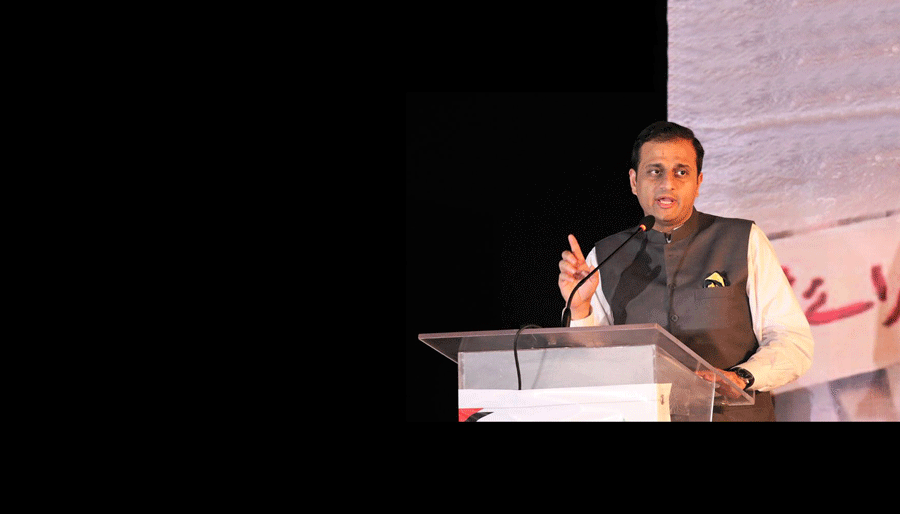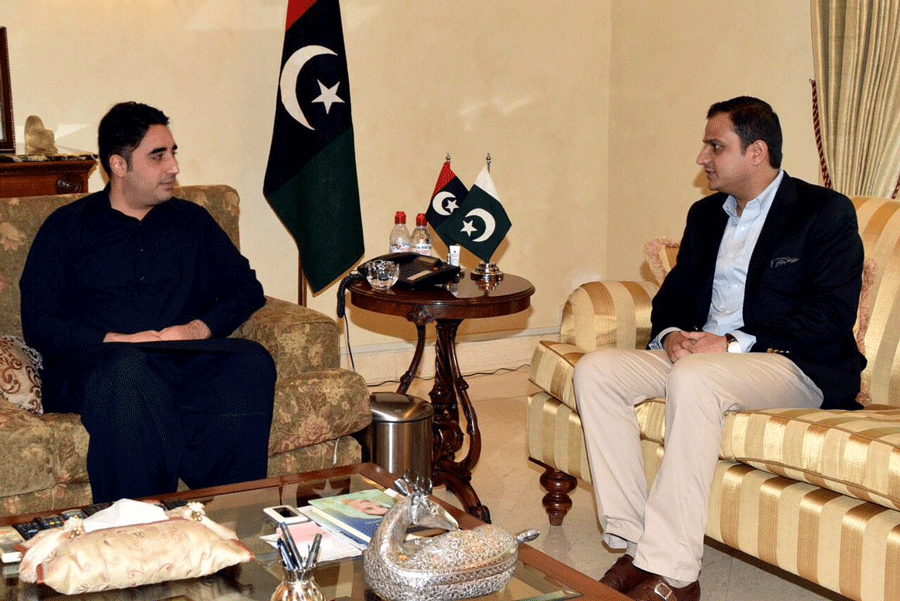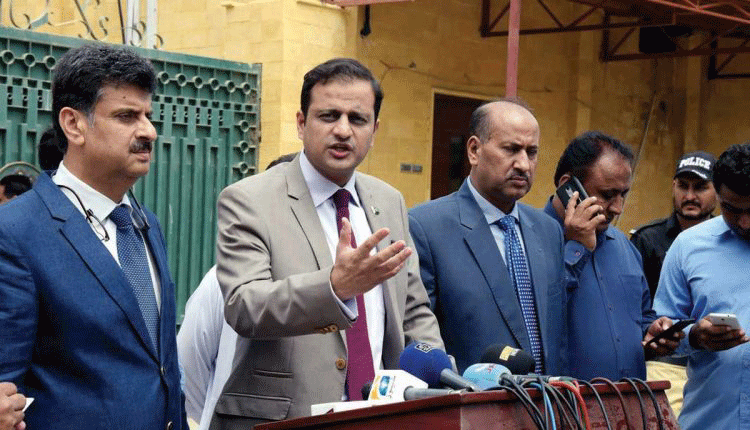“Look at what those who were exercising power in Karachi for decades have done to the city” Murtaza Wahab

Your former ally, the Muttahida Qaumi Movement (MQM), now the Muttahida Qaumi Movement-Pakistan (MQM-P), complains that you have crippled the powers of Karachi’s mayor. Why is that?
When the MQM-led local government completed its term in 2010, the old local government system of 1979 was restored through the Sindh Assembly. This was briefly replaced by the Sindh Peoples’ Local Government Act (SPLGA), introduced by the PPP and MQM in 2012. The Act was opposed, challenged in the courts and retracted in 2013, and the Sindh Local Government Act 1979 was restored once again. If the MQM had any objections regarding this, why didn’t it openly take a stance against it? Why didn’t it make an amendment in the law?
As far as I am concerned, this issue is being used as a political slogan card to divert attention from the real problem: the MQM-P’s incompetence. Abbasi Shaheed Hospital and the Karachi Institute of Heart Diseases, founded by former nazim Naimatullah Khan, for instance, are run by the Karachi Metropolitan Corporation (KMC). What has stopped it from improving these?
They have financial constraints. With the powers of the KMC reduced, it cannot generate revenues. The funds provided by the Sindh government are insufficient.
According to the law, every local government body – whether it’s the KMC or the District Municipal Corporation (DMC) – gets its share of the Octroi Zilla Tax (OZT). The Sindh Local Government Act of 1979 gives the KMC powers to impose taxes to generate their own revenues. Why don’t they use these provisions? Instead of outsourcing their work, they should do it themselves. Every other day, we hear about parking lots outsourced on contract. Why shouldn’t these be used for revenue generation? When the Sindh government tries to develop a park by outsourcing it to the private sector and improving it through a public-private partnership, legal action is taken against it. Yet the same park is willingingly outsourced by KMC for food festivals and other activities.
And why does KMC demand monetary assistance from the Sindh government? It is the only institution that is bailed out every year by the provincial government. It gets approximately
Rs 6.5 billion from the latter – and look at the results!
The Rs 6.5 billion figure is shown in the accounts as contra-entry – it is spent by the Sindh government. The mayor has no control over the funds. They do not get transferred into KMC’s blocked accounts, but into the Auditor General’s account.
For this, let us have a meeting where both, the Karachi mayor and the minister for local government, are present. I will sit with you as an umpire and we will find out who has control of those funds. If what you say is true, then I stand corrected. I hear MQM friends, who keep demanding more funds, saying that the allocated amount is spent on salaries and pensions.

That is a reference to the OZT.
No, they are referring to the additional funds. And despite the allocations, they have not been able to complete a single project in all these years. The only positive step they have taken is to outsource a park as an urban forest. They could not develop it themselves.
The OZT share goes into the salaries and pensions of the KMC employees; the amount of salaries has doubled, but the number of employees remains the same.
And who recruited the thousands of employees in the KMC? You might remember, in the last few months of the MQM-P’s term in the local government, a political stalwart who was at the helm of affairs had recruited thousands of employees in the Karachi Water and Sewerage Board (KWSB). When you keep recruiting people and are not interested in revenue generation, you will face problems. Where has the
Rs 6.5 billion gone?
They dismiss the charge of overstaffing, as KMC has not hired more staff in this tenure. However, they attribute the lack of funds to an increase in expenditure, a rise in salaries and cuts in the OZT for the salaries of the Karachi Development Authority (KDA) employees.
If that is the case, then why aren’t the other authorities, like the KDA, the Malir Development Authority (MDA), and the Lyari Development Authority (LDA), facing losses? As I have stated earlier, they hired these people in their previous term.
The Sindh government used its own resources when carrying out development work in the city, a share of which was allocated for Karachi in the provincial Annual Development Programme (ADP). The funds did not come from the OZT share. It is through the ADP allocations that the provincial government has built roads, underpasses and flyovers across the city. If we allocate funds for the K-4 Water Supply Project, it will mean additional grants from the Sindh government. We recently bought the 104-meter tall snorkel and three fire tender vehicles that were handed over to KMC.
The MQM-P complains that KDA is no longer under KMC, but when they had control of KDA, look at what they did to the city. They resorted to China-cutting; lands allocated for parks, hospitals, cemeteries and other amenities, were carved out as residential and commercial plots and sold. Such practices cannot be allowed.
They claim that the PPP’s practice of allotting hundreds of acres of lands in gothabad schemes is China-cutting on a grander scale.
That means they have admitted to doing so themselves. You have to publish this in bold letters – that the MQM has admitted to China-cutting.
The MQM says that while specific individuals may have taken advantage of their positions, the party as a whole was not involved in such practices.
If you have to give away land to the needy, you must come up with a proper plan. Why would you change the status of land allocated for parks, grounds, hospitals, dispensaries, or other public amenities? How can amenity plots be turned into residential and commercial plots? The law does not allow for this. What the PPP did in the gothabad schemes, was to regularise informal settlements inhabited by the poor and give them ownership rights. And all of this was done by following the correct procedures – private lands were not grabbed for this purpose.
Back in 2010-11, both the PPP and the MQM were trying to move legislation in the Sindh Assembly to change the status of amenity plots. It seems they were complicit in trying to legalise these practices.
It is not in my knowledge if any such legislation was proposed. That is why I would not be able to comment on it. But as far as I am aware of the law, there are many legal precedents in which Supreme Court judgments have barred any act that could change the nature of amenity plots. Lands for amenity purposes are allocated in the master plan after much deliberation; any changes would defeat the whole purpose of planning. Look at the lack of planning here – small plots allocated for single families are turned into multi-storey buildings. Now, 10 families are living in that space and you have issues with sewerage and other utilities. Look what has been done to the city by those who were given the mandate and were exercising power here for decades.
The PPP champions the cause of devolution of powers from the centre to the provinces and takes credit for fiscal autonomy as well. Yet it refrains from practicing the same when it comes to the local governments.
This question relates to the interpretation of Article-140A (the granting of political, administrative and fiscal autonomy to local governments) of the Constitution, which is sub judice as the MQM-P’s case is pending in the Supreme Court. There is a uniform local government law in all the provinces. Punjab, too, has a centralised solid waste management authority. Waste management would not have been a problem if KMC had done its duty. The concept of solid waste management is a new one. Compare the DMCs where garbage disposal is outsourced by the Sindh Solid Waste Management Board (SSWMB) with those where it is done by KMC and you will see the difference.
But compare the rates as well; the SSWMB has outsourced garbage disposal at much higher rates – Rs 3,600 per Metric Ton (MT) – while the DMCs do it for Rs 270 per MT.
Perhaps this is the reason why those DMCs perform poorly [laughs]. I have heard of these rates from my MQM friends in the Sindh Assembly as well, but haven’t seen the DMCs under KMC performing well. If there is such a vast difference in the rates, there is a difference in results as well.
You have crippled the powers of the mayor and assigned too much power to the minister for local government. He is not a superman – how do you expect him to manage?
So that means the mayor can be a Superman, but the minister for local government can’t.
But the mayor only looks after one city – not a province.
Look, if the SSWMB or the Sindh Building Control Authority (SBCA) exist at the province level, then a representative of the province, the local government minister, will lead it. A mayor cannot represent the province, as elected representatives of other districts will object to it. These are autonomous bodies, run by their own officials. The managing director of the KWSB runs the daily affairs of his own institution, while the minister for local governments supervises it. As per the law, the latter may provide policy guidelines, even to the mayor.
Does that mean the PPP is now an advocate of the centralisation of powers? Does this not go against its previous claims?
You have referred to centralisation, but I disagree. We have constituted the SSWMB, which issues policy guidelines. The decision to outsource garbage disposal was taken at the district level, by the DMCs themselves. The Board is not doing it. It is the chairman of DMC South who liaises with the concerned organisation and issues payments. I think it is a better arrangement and the improvements can be observed; just compare District South with District Central.

In one of your answers, you referred to practices in Punjab, but Punjab collects revenues in agricultural tax, while the PPP hesitates to do so. People believe it it does not want to upset its feudal support base.
I think you should do a re-check. Agricultural tax does exist in Sindh.
You have given relaxations on 25 and 50 acres of lands
The law is there, but in my view, the problem lies in its enforcement. The tax is not collected effectively. But when it comes to the political class, we have to contest elections every five years and could not do so if we were tax-defaulters. I have personally seen nomination papers of many candidates from our party, who have paid hundreds of thousands as agriculture tax.
Nevertheless, the other districts of Sindh contribute very little to the total revenue generated by the province. The provincial government gets 90 per cent of its revenue from Karachi.
I once asked the concerned officials in the revenue board whether there is any bifurcation at the district level. They said that the tax-collection authorities have their offices in Karachi; therefore, a factory in Jamshoro, or Sukkur, for instance, would be listed as being located in Karachi.
Is there any way to end the constant tussle between the PPP and the MQM-P?
This entire hullabaloo over local government powers is for political leverage. What has stopped the MQM-P from developing and improving the hospitals under the jurisdiction of KMC? Let me make them an offer in this interview: hand over Abbasi Shaheed Hospital to the Sindh Government. We will develop it the same way as the Jinnah Postgraduate Medical Centre (JPMC) and the National Institute of Cardiovascular Diseases (NICVD), where we provide state-of-the-art facilities. If they cannot run the Karachi Institute of Heart Diseases (KIHD), ask the mayor to hand it over to us. We will develop it and it will be a present from the Sindh government to District Central.
Or they could outsource it to the private sector. We are running the newly-built cancer department in the JPMC with Patient Aid Foundation and the medical facilities in Tharparkar with the Indus Hospital.
In Karachi, one can blame the MQM-P for its dismal performance, but the province is run by the PPP. There are issues of contaminated water in other parts of Sindh. A case is pending against the North Sindh Urban Services Corporation (NSUSC) and the PPP has been criticised for its poor performance.
The judiciary formed the Water Commission in that case, and the commission has gone about with its proceedings for the last two-and-a half years. We are no longer in control of the issue and have to assist the commission as per its directives. We are only following guidelines. I wonder if the situation has improved under this arrangement.
Everyone criticised the PPP for the reverse osmosis (RO) plants in Tharparkar, but now everyone admits that those RO plants were a good idea.
The National Accountability Bureau (NAB) initiated an inquiry against your former minister for local government, Jam Khan Shoro; his warrants were issued and he obtained bail before arrest.
Everyone is accountable as per the law. If an inquiry has been initiated against him, he will face it. He has not fled the country.
Saeed Ghani, the Minister for Local Government, held a joint press conference with the mayor of Karachi. Any sign of reconciliation between the two rivals?
Our intentions are very clear from this act. It is the PPP minister who visited KMC, and not vice-versa. It shows we want to work and collaborate with everyone.
Ali Arqam main domain is Karachi: Its politics, security and law and order


